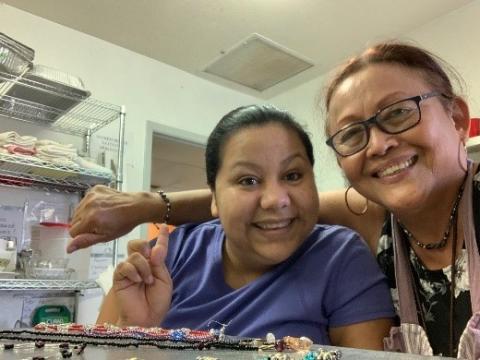
Coralis Salvador, a Maryknoll lay missioner in El Paso, Texas, reflects on how we can take up our call to be shepherds for those who are lost or marginalized.
“When Jesus saw the vast crowd, his heart was moved with pity for them, for they were like sheep without a shepherd (Mark 6:34).”
In today’s Scripture readings, one word stands out to me: shepherd.
What is a shepherd in today’s world? How are you and I called to be shepherds? The biblical definition of shepherd is one who watches over, looks after or guides someone [cf. Ps 23:1].
"The Lord is my Shepherd, there is nothing I shall want (Psalm 23)." Today’s responsorial psalm is challenging to embody. This famous quote from St. Teresa of Avila helps me further grasp its meaning: “Let nothing disturb you. Let nothing frighten you. All things are passing away. Patience obtains all things. Whoever has God lacks nothing, God alone suffices.” With the guidance of the Good Shepherd, we can live by these words.
The many lost sheep of today’s world face marginalization through trafficking, poverty, racism, tribalism, social injustices and confusion due to dissemination of misinformation that permeates society. Although there are many people working to help those who are marginalized, it is not enough. More laborers and shepherds are needed. How can you and I become shepherds ourselves?
“I will appoint shepherds for them who will shepherd them so that they need no longer fear and tremble; and none shall be missing, says the Lord (Jeremiah 23:4).” As the beloved children of God, we are called to follow the Shepherd and help shepherd others.
In our ministry at the Casa Romero Shelter in El Paso, Texas, our job is to be servants to our guests, who are migrants who recently crossed the U.S.-Mexico border. When I welcome them to the shelter, I think of spiritual writer Valarie Kaur’s invitation “to look upon the face of anyone and choose to say: You are a part of me I do not know yet.” This motivates me to be a servant-shepherd for our guests.
The shelter gives the migrants the space to recuperate from the ordeals and challenges they faced as they fled from their countries. Many of them fled from situations of grave social injustice or economic and personal insecurity. Many come seeking asylum as their only alternative for a safe and stable life, especially for their children. They arrive at our shelter after having left immigration detention, distraught, weary, and overwhelmed with worry. In other cases, they also arrive disabled, sometimes in wheelchairs. Some have been injured from accidents along the way or even from falling off the border wall while trying to climb over.
As volunteers at the shelter, we provide them meals, clothing, and facilities for rest and medical care. We take time to listen and be with them. As they leave the shelter, we send them off with bags full of food and necessities like diapers, milk for their infants and other items for their travel. They move on revived, energized, and excited to continue their journey. The shelter is a haven for them until they are ready to move on to their new homes, most often with family in the United States with whom they stay while their immigration cases are processed.
How are you called to be a shepherd through your own ministry?
Today I pray, here I am, Lord! I come to do your will. Sustain me that I may live and lead your sheep to your Kingdom. Amen.
Photo: Coralis Salvador, MKLM, doing a beading activity with a guest at Casa Romero. Courtesy of Coralis.
